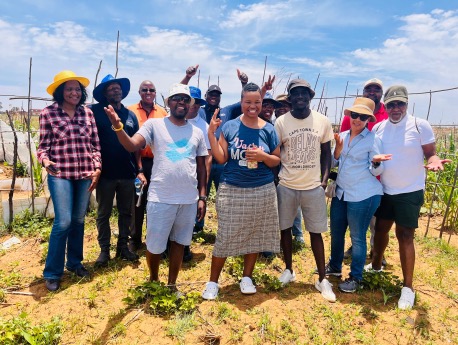
Pamela Sibiya
The Citizen Relationship and Urban Management (CRUM) department in Region C has once again reiterated its stance on the fight against social ills facing its residents. Yesterday, CRUM led the monitoring and evaluation of the Broad-Based Livelihood (BBL) programme by mining company, Harmony Gold.
BBL is an ongoing initiative aimed at upskilling the mine’s host communities with agricultural skills for sustenance and improving the lives of the residents.
Regional Director Mlamleli Belot said such projects are necessary for CRUM to be involved in as they tackle multiple issues in society. “This project speaks to one of the key strategic areas of intervention by the City of Joburg, which are poverty alleviation and food security. So far, Harmony has assisted residents largely and this is an effort of tackling joblessness, poverty and hunger.”
George Masha of Harmony Gold said this project demonstrates the organisation’s spirit of giving back to its host communities in the region and these include Doornkop, Tshepisong, Matholesville and Leratong. He also mentioned the multiple issues the programme tackles.
“Community members are trained in food gardening, construction of tunnels and ploughing of different crops. It is all rounded as it does not only enable them to generate income to feed their families, but they also give back to different NGO’s and local creches through donations.”
Partner and implementing agent of the project Umsizi Sustainable Social Solutions said he hoped for more involvement from the local youth as Roodepoort is significant for its large demographic of youth.
Lerato Molefe from the agency, which also partnered with Socio Tech, highlighted the impact since the beginning of their partnership with Harmony Gold and called for more youth involvement. “The youth struggle with motivation at the beginning but do get interested once they see the projects taking off. We still would like to see more of them as the programme is inclusive.”
Thriving food gardens yielding vegetables such as spinach, kale, mielies, cucumber and others were showcased by the beneficiaries as they demonstrated how the diverse skills gained through the initiative have assisted them.
One of the recipients, Bonisiwe Malevu, raved about the knowledge she gained from the project. “We had challenges with planting certain crops, however, through the programme, we were taken through a step-by-step training on how to plant, what to use and how to use the tools provided. Planting organically without chemicals has also been a highlight and newfound knowledge for me.”
Continuous monitoring of the project remains in place, with all the partners including the City of Johannesburg’s Social Development, putting their hands on deck for its success and subsequent community upliftment.
SOURCED FROM THE JOBURG WEBSITE.

